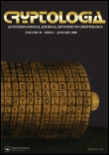
CRYPTOLOGIA
Scope & Guideline
Unlocking the Secrets of Secure Communication
Introduction
Aims and Scopes
- Historical Analysis of Cryptography:
One of the core areas of CRYPTOLOGIA is the examination of historical cryptographic techniques and their evolution. This includes the study of historical figures, events, and artifacts that have shaped the field. - Mathematical and Algorithmic Approaches:
The journal consistently features research that involves mathematical modeling, algorithmic development, and cryptanalysis techniques, focusing on both classical and contemporary cryptographic systems. - Interdisciplinary Studies:
CRYPTOLOGIA encourages interdisciplinary research that intersects with history, mathematics, computer science, and political science, highlighting the multifaceted nature of cryptology. - Technological Innovations:
The journal also places emphasis on technological advancements in cryptography, including the application of machine learning, artificial intelligence, and quantum computing to cryptographic problems. - Educational Contributions:
Another important scope includes contributions that address educational methods and resources for teaching cryptography at various academic levels.
Trending and Emerging
- Artificial Intelligence in Cryptography:
Recent publications have highlighted the application of artificial intelligence and machine learning in cryptography, such as using neural networks for cryptanalysis, marking a significant trend towards integrating advanced computational techniques. - Post-Quantum Cryptography:
The focus on post-quantum cryptography has emerged as a crucial area of interest, driven by the need to secure cryptographic systems against potential quantum computing threats. - Digital Forensics and Cryptanalysis:
There is an increasing emphasis on digital forensics and the analysis of encrypted data, reflecting the growing importance of cybersecurity and data protection in the digital age. - Cryptographic Protocols and Standards:
Emerging research is also focusing on the development and evaluation of cryptographic protocols and their implications for modern communication systems, highlighting the need for secure standards in an interconnected world. - Cultural and Historical Contexts of Cryptology:
A growing interest in the cultural and historical contexts of cryptology is evident, as researchers explore how different societies have approached cryptography and codebreaking, thus broadening the journal's scope.
Declining or Waning
- Classical Cryptography Techniques:
Research focusing on classical cryptographic techniques, such as simple substitution ciphers or historical cipher machines, appears to be less frequent as the field shifts towards more complex and modern cryptographic systems. - World War II Era Codebreaking:
Although the World War II codebreaking narratives have been significant in the past, there seems to be a waning interest in this theme as more contemporary issues and technologies come to the forefront. - Political History of Cryptology:
While the intersection of politics and cryptology has been a popular subject, recent publications indicate a decrease in papers that focus on political narratives, possibly due to the increasing technical emphasis in current cryptological research. - Physical Security and Espionage Techniques:
There is a noticeable decline in studies related to physical security measures and espionage techniques, as the journal increasingly focuses on digital cryptography and cybersecurity challenges.
Similar Journals
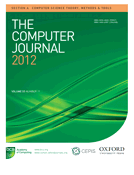
COMPUTER JOURNAL
Unlocking the Potential of Interdisciplinary ComputingCOMPUTER JOURNAL, published by Oxford University Press, is a distinguished platform for innovative research in the field of computer science, with a focus on general and miscellaneous aspects. The journal, established in 1967, continues to advance the boundaries of knowledge in computational technologies, algorithms, and interdisciplinary applications, contributing to its impressive ranking of Q2 in the 2023 Scopus category for Computer Science. With a robust ISSN of 0010-4620 and E-ISSN 1460-2067, it serves as a vital resource for researchers, professionals, and students seeking to stay at the forefront of technological advancements. Though not an open-access journal, it provides numerous access options via institutional subscriptions, making its high-impact articles widely available, especially as the journal bridges over five decades of research from 1967 to 2024. The COMPUTER JOURNAL is committed to fostering scholarly communication and ensuring that critical insights in the ever-evolving realm of computer science reach a diverse audience, thus solidifying its role as an essential resource in academia.

Digital Communications and Networks
Advancing the frontiers of digital connection.Digital Communications and Networks, published by KEAI PUBLISHING LTD, stands at the forefront of research in the rapidly evolving fields of communication, computer networks, and hardware architecture. Since its inception in 2015, this open access journal has been committed to disseminating high-quality, peer-reviewed articles that contribute to technological advancements and academic discourse in these critical domains. With an impressive Impact Factor and achieving Q1 Quartile rankings in its relevant categories for 2023, it has established itself as a vital resource for researchers, professionals, and students aiming to stay ahead in a competitive landscape. The journal's robust standing is reflected in its notable Scopus rankings, underscoring its influence in Computer Science and related fields. As we look toward the future, the journal continues to invite innovative research that shapes the digital communication landscape until 2024 and beyond.
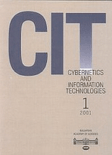
Cybernetics and Information Technologies
Fostering Collaboration in Cutting-Edge ResearchCybernetics and Information Technologies is a pivotal academic journal, published by the Institute of Information and Communication Technologies at the Bulgarian Academy of Sciences. With its Open Access policy established since 2012, this journal facilitates wide dissemination of cutting-edge research across the field of computer science, particularly in the intersections of cybernetics and information technology. Indexed in Scopus, it holds a commendable position within the Q3 quartile for 2023, ranking #103 of 232 in the category of General Computer Science, placing it within the 55th percentile and attesting to its growing influence among peer publications. The journal not only aims to publish high-quality research but also seeks to foster a collaborative platform for academicians, practitioners, and students to advance the domain of computational technologies. With a focus on innovative methodologies and applications, Cybernetics and Information Technologies remains committed to addressing current challenges and exploring the future landscape of technology and information systems.

Science China-Information Sciences
Connecting Researchers for Transformative Insights.Science China-Information Sciences is a prestigious academic journal published by SCIENCE PRESS, dedicated to advancing knowledge in the field of information sciences and computer science. Established in China, the journal has gained a remarkable reputation, with a 2023 category quartile ranking of Q1 in Computer Science (miscellaneous) and an impressive Scopus rank of #16 out of 232 in General Computer Science, positioning it within the 93rd percentile. The journal embraces a broad spectrum of topics, from theoretical frameworks to practical applications, providing a platform for researchers, professionals, and students to disseminate their findings and engage with the latest advancements in the field. With open access options available, Science China-Information Sciences ensures that innovative research is accessible to a global audience, fostering collaboration and interdisciplinary dialogue. The journal not only reflects the evolving landscape of information sciences but also plays a pivotal role in shaping future research directions.
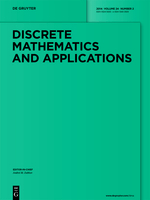
Discrete Mathematics and Applications
Unlocking the Potential of Discrete Mathematics for Real-World Impact.Discrete Mathematics and Applications, published by WALTER DE GRUYTER GMBH, is a vital academic journal catering to the expansive fields of Discrete Mathematics and Applied Mathematics. With an ISSN of 0924-9265 and an E-ISSN of 1569-3929, it serves as a reputable platform for disseminating innovative research and developments within these domains. The journal has been contributing to the academic landscape since its inception in 1991 and continues to actively publish impactful studies through 2024. Despite its current positioning in Q4 of both the Applied Mathematics and Discrete Mathematics and Combinatorics categories, the journal is dedicated to fostering essential discussions that advance understanding and application of discrete mathematical concepts. It provides researchers, professionals, and students with access to a wealth of knowledge, encouraging collaboration and growth within the field. With its strategic German headquarters in Berlin and a focused aim to enhance the visibility and significance of discrete mathematics in real-world applications, Discrete Mathematics and Applications stands out as an important resource for those seeking to contribute to the ongoing evolution of mathematical sciences.
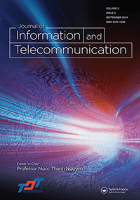
Journal of Information and Telecommunication
Connecting Minds, Advancing Knowledge in Information and Telecommunication.Journal of Information and Telecommunication, published by TAYLOR & FRANCIS LTD, is a distinguished open access journal that has been enhancing the global discourse since its establishment in 2017. With an ISSN of 2475-1839 and an E-ISSN of 2475-1847, this journal is located in the United Kingdom and dedicates its focus to the fields of information technology, telecommunications, and related disciplines. Boasting a respectable Q2 quartile ranking across various categories including Computer Networks and Communications, Electrical and Electronic Engineering, and Computer Science Applications in 2023, it ranks notably in the top percentiles of scopus rankings, asserting its significance in the academic community. The journal's commitment to open access since its inception has fostered widespread accessibility, encouraging research dissemination and collaboration on a global scale. By providing a platform for high-quality research, it aims to unite researchers, professionals, and students in their pursuit of innovation and excellence in the ever-evolving digital landscape.

PROGRAMMING AND COMPUTER SOFTWARE
Exploring the Frontiers of Software Engineering ExcellencePROGRAMMING AND COMPUTER SOFTWARE is a distinguished journal committed to advancing the field of software development and programming methodologies. Published by PLEIADES PUBLISHING INC, this journal has been a valuable resource since its inception in 1978, reaching out to researchers, professionals, and students alike. With an emphasis on rigorous peer-reviewed articles, the journal holds a Q3 ranking in the realm of Software according to the latest 2023 Category Quartiles. Though it does not offer open access, the journal ensures that high-quality research is disseminated to its audience, providing insights into evolving programming techniques, software engineering challenges, and innovative solutions. With its convergence of years extending to 2024, PROGRAMMING AND COMPUTER SOFTWARE remains a pivotal publication, fostering a deeper understanding of the complexities in computer programming while supporting the broader software community.
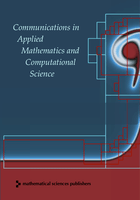
Communications in Applied Mathematics and Computational Science
Pioneering research that bridges theory and practical application.Communications in Applied Mathematics and Computational Science is a premier journal published by MATHEMATICAL SCIENCE PUBL, dedicated to advancing the fields of applied mathematics and computational science. With an ISSN of 1559-3940 and an E-ISSN of 2157-5452, this journal has established itself as a significant platform for disseminating innovative research and methodologies. Covering a vast range of topics, from mathematical modeling and numerical analysis to computation theory and applications in computer science, it holds an impressive Q2 ranking in multiple categories as of 2023, including Applied Mathematics and Computational Theory. Researchers and practitioners can access high-caliber articles that contribute to both foundational understanding and practical applications, reflecting state-of-the-art advancements in the field. The journal encourages an open exchange of ideas and results, making it essential reading for academics and professionals aiming to stay at the forefront of contemporary computational techniques and applied mathematical research. With a publication timeline spanning from 2006 to 2024, it continues to enrich the intellectual landscape and foster collaboration across disciplines.
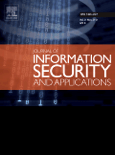
Journal of Information Security and Applications
Unveiling Insights in Information Security ExcellenceJournal of Information Security and Applications, published by ELSEVIER, is a premier outlet for cutting-edge research in the field of information security and applications. With a dedicated ISSN of 2214-2126 and an E-ISSN of 2214-2134, this journal ranks impressively in the top quartile (Q1) across multiple categories as of 2023, including Computer Networks and Communications, Safety, Risk, Reliability and Quality, and Software. The journal’s notable Scopus rankings further reflect its impact, holding positions within the top 15% in several engineering and computer science areas. Spanning a converged period from 2013 to 2024, the journal aims to disseminate high-quality research findings, facilitating a vibrant platform for scholars, practitioners, and students to engage with contemporary challenges in information security. Although not an open-access journal, the knowledge shared within its pages is indispensable for those dedicated to advancing the technological and theoretical underpinnings of security measures in various applications.

IACR Transactions on Symmetric Cryptology
Empowering Research in Cryptographic ExcellenceIACR Transactions on Symmetric Cryptology, published by the esteemed RUHR-UNIV BOCHUM at the Horst Gortz Institute for IT Security, stands as a beacon of innovation in the field of cryptology. With an E-ISSN of 2519-173X and a commitment to open access since 2016, this journal provides a platform for groundbreaking research that enhances our understanding and application of symmetric cryptographic methods. Reflecting its high academic standing, the journal boasts a Q1 ranking in categories such as Applied Mathematics, Computational Mathematics, and Computer Science Applications, positioning it among the top tiers of scholarly publications internationally. Researchers, professionals, and students are encouraged to contribute and access vital cutting-edge studies that inform both theoretical and practical advances in secure communication technologies. Situated in Bochum, Germany, the IACR Transactions on Symmetric Cryptology is an essential resource for anyone invested in the future of cryptographic research.